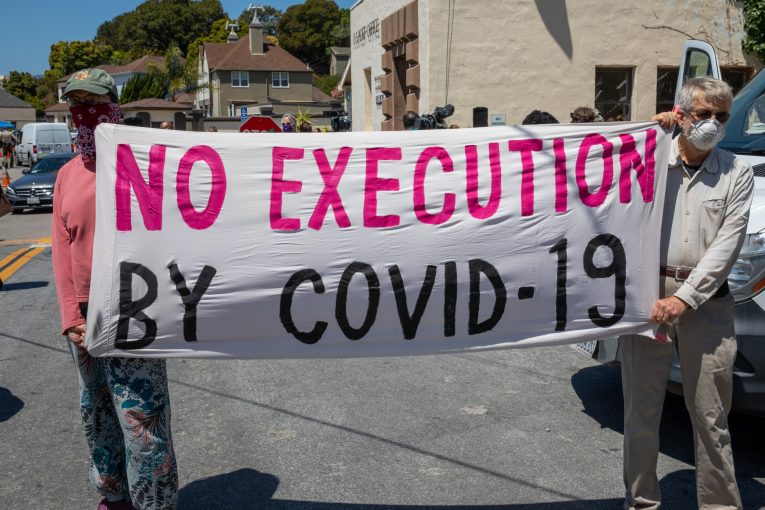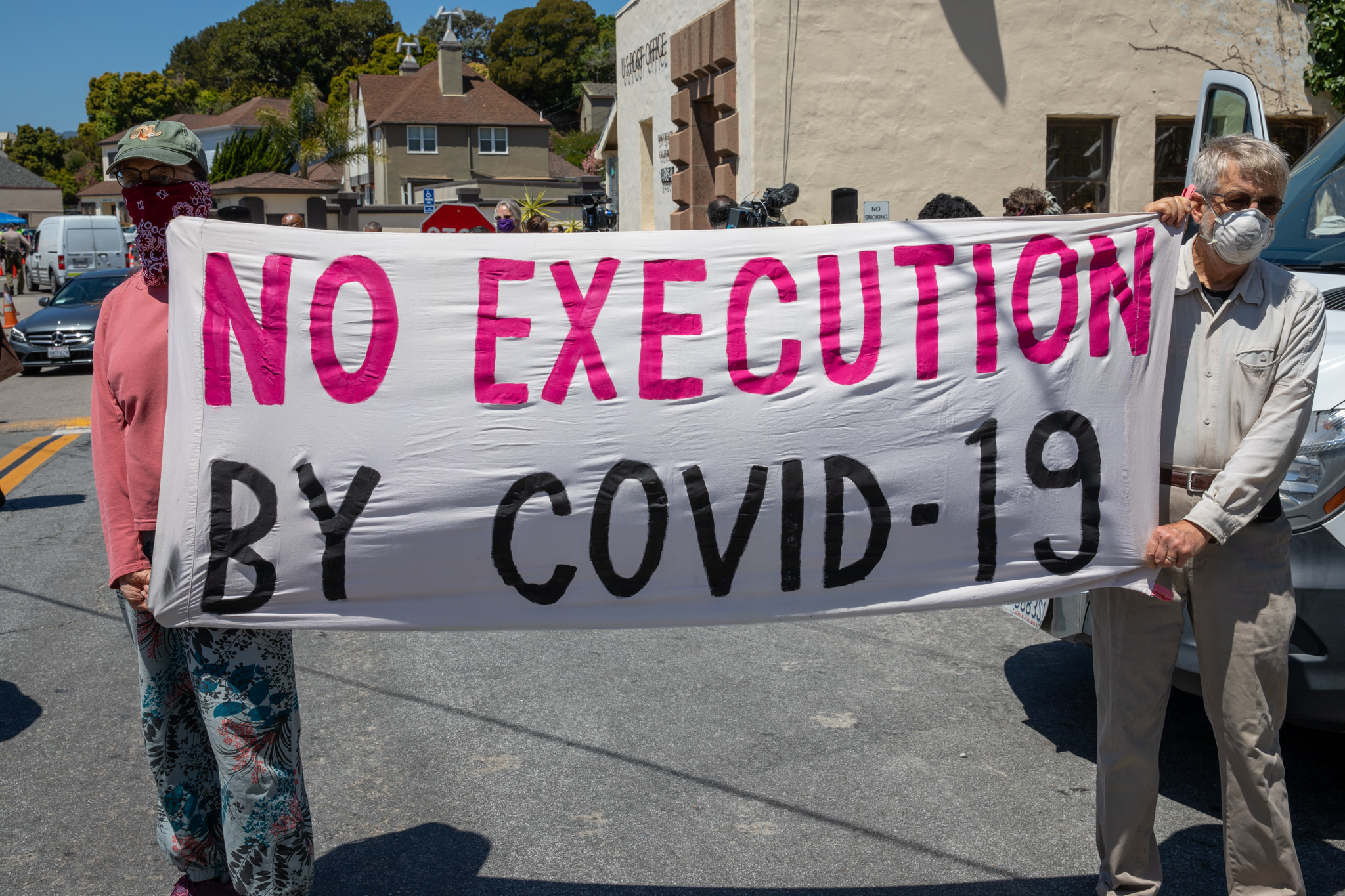
 By Jose Medina
By Jose Medina
MARIN, CA – An incarcerated essential worker, incarcerated people with underlying health conditions and expert testimony from a psychiatrist highlighted Thursday’s evidentiary hearing here in Marin County Superior Court about COVID-19 in San Quentin Prison and (CDCR) CA Dept. of Corrections and Rehabilitation.
The testimonies were concerning.
Michael Burroughs is an incarcerated person who works as a main chef at San Quentin, preparing meals and maintaining the kitchen area. He revealed that, despite feeling sick in late June of last year, he was ordered to continue working as a chef until July 5 although he was handling food while infected.
When asked whether or not he had the right to refuse working in the kitchens, Burroughs answered, “No, I don’t have the ability to refuse to work at the kitchens” and that if he does refuse he would get penalized and written up for a rules violation report.
In an effort to follow CDC guidelines in working during the COVID pandemic, Burroughs recalled a time where he refused to go to work unless he was given the proper mask.
He revealed that “when the warden started having training for essential workers, such as myself, they specifically stated that until you had an N95 mask you cannot return to work.”
Burroughs recalled the back and forth he had with an officer who was there to order him back to work. Burroughs recalled, “I kept stating to him that I had not been mask fitted and refused to go to work and was served a rules violation report.”
He told the court, as an essential worker, that San Quentin Prison was keen on having all essential workers report to their jobs with mask or no mask.
Aside from essential workers not being given the proper working conditions, the most vulnerable people in San Quentin prison were also subjugated to dangerous environments.
Louis Crawford is a 70-year-old incarcerated person with various underlying diseases and is therefore highly susceptible to COVID.
Crawford made it clear to the court that the CDCR did not make him feel safe during the pandemic because there was “too much congregation between a lot of people…they don’t separate us right in my opinion.”
He recalled having a cellmate who got infected with COVID, noting, “they took my cellmate out first for high fevers and they left me in there.”
A few days later Crawford was infected with the virus and had to be transported to the hospital where he received treatment for his severe symptoms.
When asked where he could have gone if CDCR had options of releasing him, Crawford stated, “I got plenty of places with my family I could go to,” adding, “I have no family problems.”
A third witness, Willie Hearod, recalled his experience dealing with the San Quentin outbreak. He is an incarcerated person diagnosed with Type I Diabetes, making him vulnerable to COVID.
Throughout the time of the San Quentin COVID outbreak, Hearod recalled his medical needs not being met describing times in which “I wouldn’t get my insulin on time, my AM injections being late, my PM injections were late, and they didn’t have test strips to test my blood sugar.”
He described there being no social distancing measures while he would get his insulin and recalled waiting in line with 30 to 40 other incarcerated people.
With his medical needs not being properly met, Hearod ended up suffering from this negligence. He recalled that his “blood sugar went up and down, my eyes would get blurry, I couldn’t read, barely got around, and I felt fatigue.”
He recalled that on June 2 last year there was an attempt by San Quentin staff to assign him a new cellmate from the California Institute of Men. Hearod was alarmed by this development and told his tier officer that “I am not accepting nobody cause I’m a high risk medical and if I catch the virus I can die from it.”
According to Hearod, the newly assigned cellmate was standing near the entrance of his cell for a good 15 to 20 minutes while he insisted to the officer that he was not allowing anyone to be assigned to him.
Hearod pleaded with the officer, “Please, I am always willing to help out, but this scares me,” and reminded the officer, “I’m a diabetic, I could die from him getting in my cell and making me sick”
Instead of listening to Hearod’s medical conditions and accommodating him accordingly, the officer penalized Hearod by writing him up with a rules violation report for disobeying orders that resulted in a loss of privileges for 90 days.
After that interaction Hearod began to feel ill and experienced loss of taste, chest pain, cold sweats, and muscle aches. He said that he has suffered from the long term effects of infection, “my diabetes is out of control and I’m limping when I walk” and added “the bottom of my left foot feels like I got rocks when I take a step.”
When asked to describe his experience with San Quentin’s modified program as a response to the COVID outbreak, Hearod stated that “it’s hard with this whole modified program we get let out for an hour every other day, it’s what tyranny is.”
He mentioned that in the little time he has to go outside, he prioritizes getting his insulin.
Hearod emphasized how difficult it has been being a diabetic and having to deal with being locked up in a cell for long hours.
He furiously insisted that “they know I take insulin from banging on the door to trying to get the officer’s attention to open up the door and it depends on whether they come up here or not.”
Apart from having to suffer with the long term effects of COVID infections, incarcerated people in San Quentin are also facing a deterioration in their mental health.
Dr. Terry Kupers is a community psychiatrist and was called in as an expert on mental health in correctional settings including the effect of solitary confinement on the mental health of incarcerated people.
He revealed that he conducted tours of San Quentin prison on two separate occasions on Oct. 5, 2020, and the latest one on April 2 of this year. He specifically toured the Adjustment Center and learned how the facility was used for isolation and quarantine of incarcerated people infected or possibly exposed to COVID.
As a psychiatrist, Dr. Kupers stressed that his goal is to help people have more agency over their lives and pointed out that being in prison limits a person to practice agency.
He argued that while being in prison a person has “no control over the environment, no control over the size of cell, no control over who you’re interacting with” and concluded “all of that tends to have a negative effect, a damaging effect on the psychology of the people who dwell there.”
The court was then shown a picture of a cell in San Quentin where Dr. Kupers noted that ”you can’t even walk in between the narrow space between the bunk and the wall with the other person anywhere but in their bunk, so it is especially stressful when there are two in a small cell in the midst of a pandemic.”
He compared the living conditions between incarcerated people and people outside of prisons.
People on the outside have full control of their environment and can act accordingly in response to a pandemic by social distancing, having the privilege of seeing any doctor of their choice, and freely using phones and Zoom calls to socially interact with others, he said.
Dr. Kupers then contrasted the living conditions of incarcerated people by making it clear that they do not have control over their own living spaces. They are assigned cellmates, their phone calls are regulated, and their recreational activities are restricted.
Dr. Kupers learned of San Quentin prison’s practices and policies for the COVID pandemic and noted that “there are more restrictions, through these modified programs…an individual is locked there and kept in that cell with another individual for up to 24 hours throughput most of 2020. They don’t have access to recreation, they can’t go to the yard.”
Taking all of this information into consideration, Dr. Kupers then defined solitary confinement as the act of isolating an individual in a cell for more than 22 hours a day with limited activities.
He also noted that since San Quentin repeatedly locked up incarcerated people for long hours in their cells throughout most of 2020, there would be immense psychiatric consequences.
Dr. Kupers defined those consequences as psychiatric damage and stated that people who experience solitary confinement can suffer from severe anxiety, insomnia, problems with thinking coherently, paranoia, difficulty in concentrating, and suicidal thoughts.
He told the court that “there are only usually between three and five percent of prisoners within the system in solitary confinement but 50 percent of the suicides occur there.”
Dr. Kupers added that mental illnesses, such as depression or schizophrenia, are exacerbated by the conditions of solitary confinement.
He explained that mental illness “episodes will be more intense and severe, the time in between episodes will be much shorter and the overall disability and prognosis will be much dire.”
Aside from solitary confinement deteriorating mental health, Dr. Kupers stated just the mere expectation of going to solitary confinement can increase anxiety levels.
He then pointed out that the Adjustment Center facility in San Quentin is notorious for holding the “worst of the worst according to the CDCR” and that it is used for solitary confinement.
Dr. Kupers described the facility as a place where “they are locked by themselves for nearly 24 hours a day and they go to a yard that is about the size of a carport where you can’t exercise and it’s fenced in” he added that “the prisoners call them cages.”
Given the characteristics of the facility the Adjustment Center is a place that is dreaded by the incarcerated people in San Quentin.
When asked what his opinion was on the use of the Adjustment Center for quarantine and isolation, Dr. Kupers scathingly remarked that it is counter-therapeutic.
He emphasized to the court that “prisoners dread going to solitary and that dread leads many prisoners to not taking a test for COVID and not report to the staff that they are suffering from symptoms.”
He added that incarcerated people will say, “‘I don’t want to tell them…they’re going to put me in the Adjustment Center’ so they then are spreading the virus without being treated without being quarantined.’”
The hearing will reconvene Friday.
Jose graduated from UC Davis with a BA in Political Science and has interned for the California State Legislature. He is from Rocklin, CA.
To sign up for our new newsletter – Everyday Injustice – https://tinyurl.com/yyultcf9
Support our work – to become a sustaining at $5 – $10- $25 per month hit the link:




